|
Bert Fontaine and his younger sibling endured and overcame traumatic experiences at a church-run residential school.
The older brother of former Assembly of First Nations national chief Phil Fontaine, Bert died on Sept. 24 at 85.
He was born at Sagkeeng First Nation when it was known as the Fort Alexander Reserve in 1937. He and Phil went to the same local residential school operated by the Oblates of Mary Immaculate.
Advertisement
 Why this ad? Why this ad?
Phil has spoken many times over the years about the physical, psychological, and sexual abuse he suffered while at the residential schools.
Bert never really spoke publicly about what he went through, but, as his family put it in his obituary, “He was strong, resilient and endured and overcame traumatic experiences and hardship starting at a young with the loss of his father, J.B., while still in residential school.”
Together, Bert and his brother adopted then-Winnipeg Archbishop James Weisgerber into their family in 2012, through a traditional ceremony, to serve as a gesture of reconciliation with the Roman Catholic church. Bert’s obituary even mentions Weisgerber as a surviving family member.

Bert’s mother, Agnes, was a trailblazer, becoming the first Indigenous woman in the country to be elected to a band council in 1952.
Bert was an athlete in his younger days, modelling his hockey-playing style after Gordie Howe of the Detroit Red Wings — Bert’s favourite team.
He was a skilled player, competing well into his 40s as part of a Team Canada old-timers squad that battled a European team in Copenhagen. Bert scored a goal and the Canadians prevailed 5-3.
Bert also loved to play baseball. He was part of the “Sober Nine” team of Victoria Beach and played in tournaments in Sagkeeng and all around the area.
While his brother went into Indigenous politics, Bert remained in his community and helped at the grassroots level. He served as Sagkeeng’s Director of Health and was instrumental in establishing a new health centre there, as well as bringing in a pharmacy, doctor, and dental services.
Earlier in life, Bert worked for what is now Hydro One in Ontario. Bert’s typical quick thinking (and wit in recounting it later) compelled him to raise his hand when a boss came into the recruitment room and asked, “Are there any drillers here?” even though he had never picked up a drill in his life.
He later came back to his community and worked at the nearby Abitibi Paper Mill in Pine Falls for 17 years. He even had a side job where he cut pulp wood for extra money. The extra cash not only helped him buy presents at Christmas but paved the way for him to purchase his first house.
He then worked in the province’s department of justice for 25 years, travelling to many First Nation communities up north.
During his retirement years, Bert loved to have dinner and play the slots at the South Beach Casino, but family was very important to him.
He also would travel across the country “wherever and whenever his younger brother Phil wanted company or brotherly support”.
I met Bert a few times, as my wife worked with him for a few years at one point in her career. It’s hard to imagine a kinder, intelligent and positive man than Bert. He was always quick on the uptake with a joke.
Besides Theresa, his wife of 65 years, and brother, Phil, Bert is survived by his four daughters, four sons, traditional brothers Archbishop Weisgerber and Fred Kelly, grandchildren, great-grandchildren, and great-great-grandchildren. He was predeceased by his parents, a son and daughter, eight brothers, and two sisters.
Read more about Bert.
How They Lived
Betty Gregor needed health care when she was a teen. So, perhaps, that’s why she went into home care.
Betty, who died on Aug. 21 at 83 years of age, had rheumatic fever in her early teens and was in hospital for two months. She then spent a year recovering at home.
Betty was left with a damaged heart valve and some allergies, but her experience didn’t stop her. She went on to care for and comfort others as a home-care worker for years.
Read more about Betty.
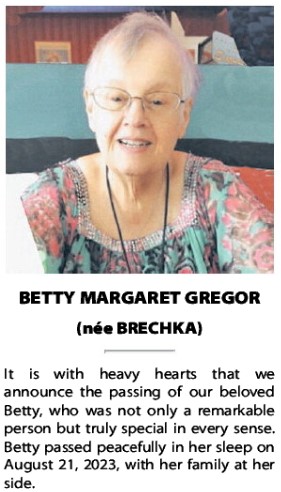
Bruce Hill’s day job for years was working on trains, but after hours it was motorcycles.
Bruce, who was 67 when he died on Sept. 14, worked as a train mechanic on the night shift at both CN Rail and CP Rail.
After he was done work, he was able to share his passion for motorcycles by instructing the motorcycle course for Safety Services Manitoba for more than four decades.
Read more about Bruce.
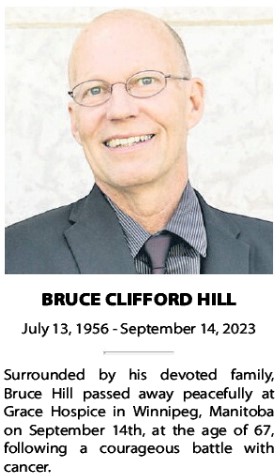
If you saw the Winnipeg Blue Bombers play in years past or took in a major concert, be grateful for Dianne Foster.
Dianne, who died on Aug. 19 at 63 years of age, was the box office manager for the Bombers and Canad Inn Stadium for years and was well-respected in the industry.
Read more about Dianne.
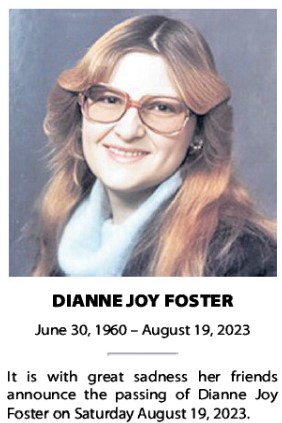
Brian Roche was a farmer who owned his own trucking business.
But Brian, who was 84 when he died on Sept. 11, was also a member of the Vintage Locomotive Association, the organization which operates the Prairie Dog Central.
And it was because of that connection — and over a cup of coffee — that Brian agreed to give the association the land where its rail station and steam engine sits today.
Read more about Brian.
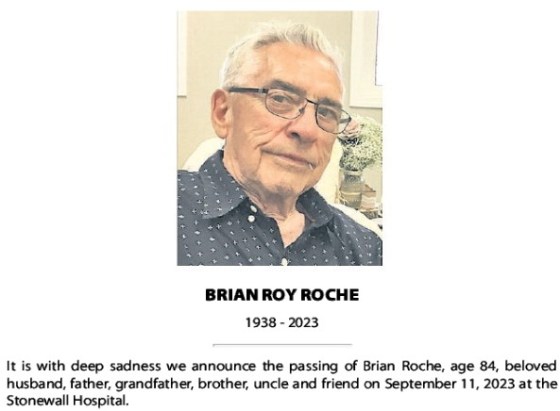
Daniel Kidd was a member of the Royal Canadian Legion for three decades.
Daniel, who was 72 when he died on Sept. 20, worked his way up through the ranks to serve as president of Manitoba and NW Ontario Command.
Read more about Daniel.
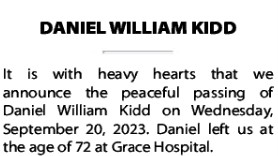
Bruno Zimmer spent his career fighting for worker’s rights.
Bruno, who 87 when he died on Sept. 18, was a meat cutter at Swift’s when he became involved in his local union.
He went on to be elected president of UFCW 111 before that local merged with UFCW 832, which represents grocery store workers.
Bruno was the union’s secretary-treasurer.
Read more about Bruno.
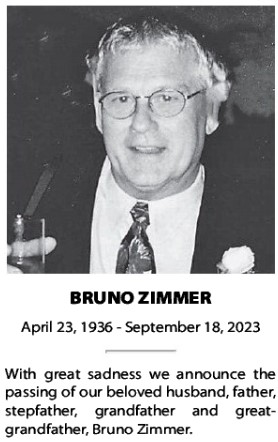
A Life’s Story
Mary Lewyc lived to 100 and bananas may have been key to her longevity.
“Everyone should eat a banana every day,” advised Mary, who died on Jan. 15.
But there were several moments when if things had gone differently, she might not have lived nearly as long.
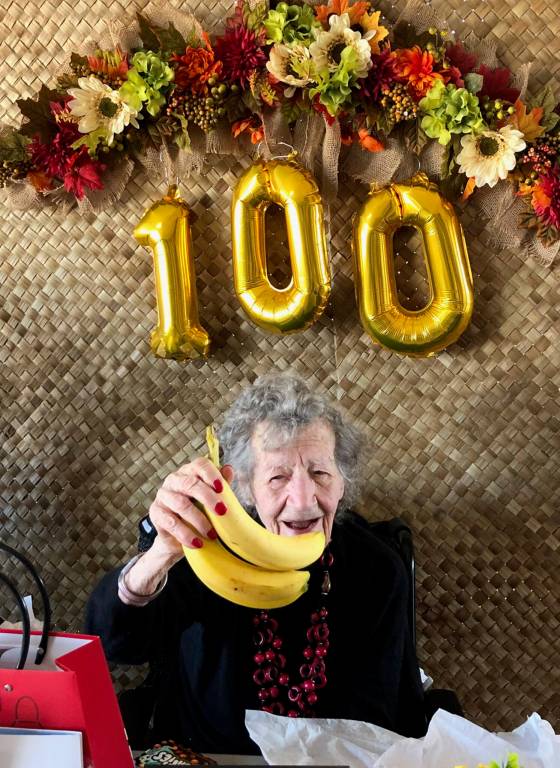
Mary Lewyc loved bananas. They were her favourite present at her 100th birthday party. (Supplied)
She was born in a village in the former USSR, and her father was taken away to prison camps in Siberia. She went to look for him and found him there.
During the Second World War, she was a second officer in training on a transport ship when she was captured and put into a forced labour work camp.
“I remember the stories about how many times she was on the verge of death in those distant years of the Second World War and every time her intuition rescued her from trouble,” said Alexey Eliseev, a family relative living in Russia.
“I learned from her to listen to myself, my inner voice, my intuition.”
To read more about Mary, go here.
Until next time, I hope you continue to write your own life’s story.
|

